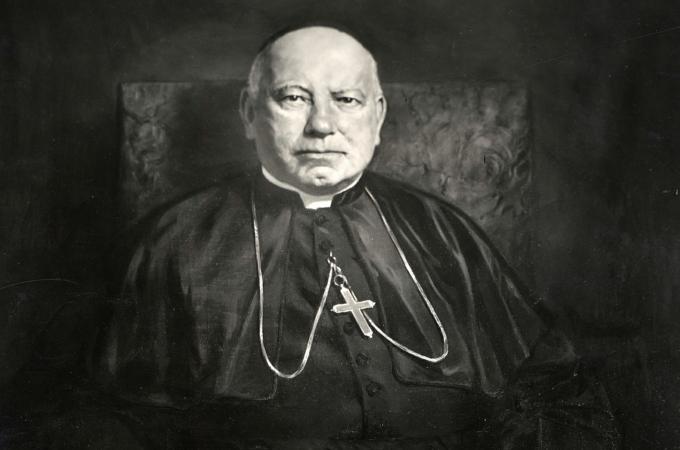The diocesan synod of 1909
In February 1909, clergy of the Archdiocese of Boston convened at the Cathedral of the Holy Cross for a diocesan synod called by then Archbishop William H. O'Connell. Regular readers may recall that a synod is a gathering of all clergy in the diocese, which, unlike modern synods, did not include laity or women religious. It was an opportunity for the Bishop of Boston to seek counsel from his priests and vote on practical measures to guide worship, administration of the parishes, and other matters of daily life.
This was the first synod of the 20th century, the most recent having been in 1886, and the first of two during Cardinal O'Connell's tenure as archbishop. Historians debate the significance of this synod because the resulting guidelines closely resembled those of 1886. What is intriguing is the opening address delivered by Cardinal O'Connell on Feb. 11, which reveals his thoughts on his position as leader of the archdiocese and vision for its direction during the coming years.
Cardinal O'Connell opens by describing the importance of written guidelines, such as those to be discussed, and quickly moves on to asserting his authority. The clergy are guided by God and the Holy Spirit, he says, and they are only his messengers. At the same time, this "power which established the priesthood established the Church's authority ... We became princes (bishops) and servants (priests) in the same moment. Princes to dispense, servants to obey." He claims this to be "of the very nature of the Church, and "to those exercising the sacred ministry this must never be lost sight of."
If this required clarification, he continues that the purpose of this synod was to "make us realize that we are not separate units, each working his own way, but an organic body in which the members are directed from the head through various centres down to the functions of each member."
This synod was called less than two years after his installation as archbishop of Boston, and by these opening statements we can see Cardinal O'Connell using the gathering to assert his authority over the archdiocese, including those assembled. The strong language may come as a shock to modern readers, and indeed those contemporaries conditioned to the quiet and humble ways of his predecessor, but we must also keep in mind that strong statements and oratory ability were prized attributes of public figures during this era.
Beyond clearly stating his authority, he also outlines his vision for the archdiocese. One of the first points of emphasis is the importance of the seminary, reflected by his eventual expulsion of the Sulpician Fathers who staffed the institution and replacing them with diocesan clergy to assume closer control.
He also speaks about the Catholic community as not only a "spiritual body," but body of citizens with personal and public interests. To defend their interests and beliefs they should detect misrepresentations of their faith and redress them with the truth.
"Our churches and schools are as sacred to us as our homes," O'Connell continues, "to defeat public attacks on our position and our vital interests we must have a public voice. That public voice is the press." This statement is a direct reflection upon his activity of the previous year, purchasing The Pilot and making it the official voice of the diocese as when in first appeared in 1829. In general, the Catholic community grew in stature during his tenure, symbolized by a more active role in politics and public life.
Further points of emphasis include participation in lay organizations, which would bind people closer to their faith and their parish community, and the need to increase opportunities to provide Catholic education to youth.
Cardinal O'Connell closes the address by listing 20 statutes that he wishes to discuss during the synod. They cover a range of subjects, such as how altars are to be decorated, how priests should dress outside of Mass, how parish finances are managed, and where to keep administrative documents.
While much of his statements seem to accurately outline his time as archbishop with alarming accuracy, we should be wary that the text cited here was published in 1922, leaving time for revision of the original address with the benefit of hindsight.
While we may excuse some of the language as in keeping with the time, it has not helped Cardinal O'Connell's reputation from a contemporary or historical perspective. Criticisms of him include his self-important attitude, and holding pastors, parishes, and institutions to very high standards of conduct -- standards he was unable to meet as he became embroiled in several scandals both before and during his time as archbishop.
- Thomas Lester is the archivist of the Archdiocese of Boston.



















